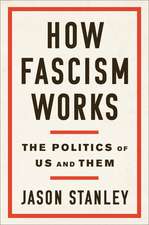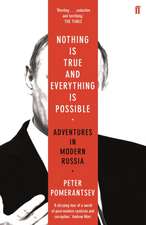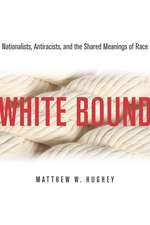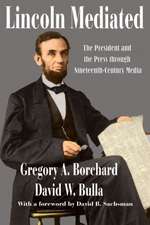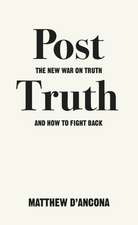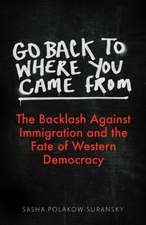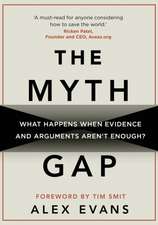White Rage: The Unspoken Truth of Our Racial Divide
Autor Carol Anderson, Ph.D.en Limba Engleză Paperback – noi 2017
| Toate formatele și edițiile | Preț | Express |
|---|---|---|
| Paperback (2) | 48.23 lei 3-5 săpt. | +40.46 lei 5-11 zile |
| Bloomsbury Publishing – 22 iul 2020 | 48.23 lei 3-5 săpt. | +40.46 lei 5-11 zile |
| Bloomsbury Publishing – noi 2017 | 99.79 lei 3-5 săpt. |
Preț: 99.79 lei
Nou
Puncte Express: 150
Preț estimativ în valută:
19.10€ • 19.86$ • 15.77£
19.10€ • 19.86$ • 15.77£
Carte disponibilă
Livrare economică 24 martie-07 aprilie
Preluare comenzi: 021 569.72.76
Specificații
ISBN-13: 9781632864130
ISBN-10: 1632864134
Pagini: 304
Dimensiuni: 140 x 210 x 24 mm
Greutate: 0.32 kg
Editura: Bloomsbury Publishing
Colecția Bloomsbury USA
Locul publicării:New York, United States
ISBN-10: 1632864134
Pagini: 304
Dimensiuni: 140 x 210 x 24 mm
Greutate: 0.32 kg
Editura: Bloomsbury Publishing
Colecția Bloomsbury USA
Locul publicării:New York, United States
Caracteristici
Anderson's
article
titled
"Ferguson
isn't
about
black
rage
against
cops.
It's
white
rage
against
progress"
in
theWashington
Postwent
viral
and
was
the
most
read
article
for
the
paper
for
all
of
2014
with
more
than
4,000
comments.
Notă biografică
Carol
Andersonis
the
Charles
Howard
Candler
Professor
and
Chair
of
African
American
Studies
at
Emory
University.
She
is
the
author
of
many
books
and
articles,
includingBourgeois
Radicals:
The
NAACP
and
the
Struggle
for
Colonial
Liberation,
1941-1960andEyes
Off
the
Prize:
The
United
Nations
and
the
African
American
Struggle
for
Human
Rights:
1944-1955.
She
was
named
a
Guggenheim
Fellow
for
Constitutional
Studies.
She
lives
in
Atlanta,
Georgia.
Recenzii
[White
Rage]
is
an
extraordinarily
timely
and
urgent
call
to
confront
the
legacy
of
structural
racism
bequeathed
by
white
anger
and
resentment,
and
to
show
its
continuing
threat
to
the
promise
of
American
democracy.
I've read a fair bit of African-American history, butWhite Rage, by Carol Anderson, which is beautifully written and exhaustively researched, illuminated for me just how deliberately education policy in the United States disenfranchised African-Americans.
[A] slim but persuasive volume . . . A sobering primer on the myriad ways African American resilience and triumph over enslavement, Jim Crow and intolerance have been relentlessly defied by the very institutions entrusted to uphold our democracy.
White Rageis a riveting and disturbing history that begins with Reconstruction and lays bare the efforts of whites in the South and North alike to prevent emancipated black people from achieving economic independence, civil and political rights, personal safety, and economic opportunity.
An unflinching look at America's long history of structural and institutionalized racism,White Rageis a timely and necessary examination of white anger and aggression towards black America . . . A compelling look at American history,White Ragehas never seemed more relevant than it does today.
White Ragebelongs in a place of honor on the shelf next to other seminal books about the African-American experience such as James Baldwin'sThe Fire Next Time, Isabel Wilkerson'sThe Warmth of Other Suns, and Michelle Alexander'sThe New Jim Crow.
[A] powerful survey of American history as seen in the violent white reactions to black progress, from Reconstruction to the great migration to the current political landscape.
Anderson has shown, with her well-sourced (she has several hundred detailed footnotes) and readable book, why the fights over race and access to the perquisites of American citizenship grind on . . .White Ragelends perspective and insight for those of us who are willing to confront, study and learn from the present situation in this country.
Two steps forward, one step back:White Ragedeftly crafts the pattern of how White backlash has always countered African American progress.
White Rageis a harrowing account of our national history during the century and a half since the Civil War--even more troubling for what it exposes about our present, our deep and abiding racial divide. This is necessary reading for anyone interested in understanding--and perfecting--our union.
Anderson's keen analysis presents a powerful portrait of white rage and entitlement - two shameful forces that continue to characterize our national conversation about race.
Anderson lays out a troubling yet persistent pattern in American history that started during Reconstruction. For every advancement achieved by African Americans, there is an unequal and ferociously opposite reaction. . . . Anderson's book lays out the horrific story.
In every episode ofWhite RageAnderson amplifies and elongates this initial claim [white America's seething resistance to African Americans' sociopolitical advancements] into a striking argument about the nation's failure to recognize African Americans as full members the citizenry. Though stretching a stand-alone essay into an extended study doesn't work very often,White Rageoperates efficiently and elegantly, offering readers new intelligence about American experience. Following Anderson, one gains insight by accrual.
Professor Carol Anderson's recent bookWhite Rageis a tragic, yet invaluable contribution to our understanding of race relations throughout American history.
It's shocking, beautifully written, and, with white supremacy knocking on the White House door, more important than ever. Some books are great, some books are essential.White Rageis the latter.
Truly, I couldn't put it down. [White Rage] draws a razor-sharp line from the Civil War to Trayvon Martin with all the stops in between. If you want context for . . . the life we're living in this country right this minute, I urge you to pick up a copy. [Its] 160 pages have the power to change your life.
Powerful . . . Like a meticulous prosecutor assembling her case, Anderson lays out a profoundly upsetting vision of an America driven to waves of reactionary white anger whenever it's confronted with black achievement.
There is [a] book that I think we all need to read and read again: Carol Anderson'sWhite Rage. It so plainly shows us that whenever African Americans started to make any strides (in education, voting, employment, home ownership), those gains were a threat to the status quo of inequality - those strides sparked incredibly intense and well-organized blowback - all of which leads me to appreciate just how insidious and persistent racial hatred is in the U.S. We have to get smarter, bystanders . we need your help, it is not enough to proclaim that you're not racist, we need your help.
Bracing . . . It might all seem very conspiratorial and cloak-and-dagger, were it not also true. Reading through all the frightfully inventive ways in which America makes racial inequality a matter of law (and order) has a dizzying effect: like watching a quick-cut montage of social injustice spanning nearly half a millennium.
[F]or readers who want to understand the sense of grievance and pain that many African Americans feel today,White Rageoffers a clearly written and well-thought-out overview of an aspect of U.S. history with which the country is still struggling to come to terms.
Prescient . . . provides necessary perspective on the racial conflagrations in the U.S.
Anderson's mosaic of white outrage deserves contemplation by anyone interested in understanding U.S. race relations, past and present.
[An] engaging, thought-provoking work . . . Anderson's clear, ardent prose detailing the undermining of America's stated ideals and democratic norms is required reading for anyone interested in the state of American social discourse.
Few historians write with the grace, clarity, and intellectual verve Carol Anderson summons in this book. We are tethered to history, and withWhite Rage, Anderson adeptly highlights both that past and the tenacious grip race holds on the present. There is a handful of writers whose work I consider indispensable. Professor Anderson is high up on that list.
To overcome our racial history, Americans must first learn our racial history--as it truly and painfully happened. This powerful book is the place to start.
Anderson's book compellingly recenters America's racial narrative on the propulsive power of white fury. The sentiments she traces, and the force they carry, don't just explain our political past; they also reveal our political present.
A short, simple history about the racial divide in America - but really approachable.
I highly recommend reading . . . Carol Anderson'sWhite Rageto help white people understand their place in the reproduction of racism and how to fight it.
I've read a fair bit of African-American history, butWhite Rage, by Carol Anderson, which is beautifully written and exhaustively researched, illuminated for me just how deliberately education policy in the United States disenfranchised African-Americans.
[A] slim but persuasive volume . . . A sobering primer on the myriad ways African American resilience and triumph over enslavement, Jim Crow and intolerance have been relentlessly defied by the very institutions entrusted to uphold our democracy.
White Rageis a riveting and disturbing history that begins with Reconstruction and lays bare the efforts of whites in the South and North alike to prevent emancipated black people from achieving economic independence, civil and political rights, personal safety, and economic opportunity.
An unflinching look at America's long history of structural and institutionalized racism,White Rageis a timely and necessary examination of white anger and aggression towards black America . . . A compelling look at American history,White Ragehas never seemed more relevant than it does today.
White Ragebelongs in a place of honor on the shelf next to other seminal books about the African-American experience such as James Baldwin'sThe Fire Next Time, Isabel Wilkerson'sThe Warmth of Other Suns, and Michelle Alexander'sThe New Jim Crow.
[A] powerful survey of American history as seen in the violent white reactions to black progress, from Reconstruction to the great migration to the current political landscape.
Anderson has shown, with her well-sourced (she has several hundred detailed footnotes) and readable book, why the fights over race and access to the perquisites of American citizenship grind on . . .White Ragelends perspective and insight for those of us who are willing to confront, study and learn from the present situation in this country.
Two steps forward, one step back:White Ragedeftly crafts the pattern of how White backlash has always countered African American progress.
White Rageis a harrowing account of our national history during the century and a half since the Civil War--even more troubling for what it exposes about our present, our deep and abiding racial divide. This is necessary reading for anyone interested in understanding--and perfecting--our union.
Anderson's keen analysis presents a powerful portrait of white rage and entitlement - two shameful forces that continue to characterize our national conversation about race.
Anderson lays out a troubling yet persistent pattern in American history that started during Reconstruction. For every advancement achieved by African Americans, there is an unequal and ferociously opposite reaction. . . . Anderson's book lays out the horrific story.
In every episode ofWhite RageAnderson amplifies and elongates this initial claim [white America's seething resistance to African Americans' sociopolitical advancements] into a striking argument about the nation's failure to recognize African Americans as full members the citizenry. Though stretching a stand-alone essay into an extended study doesn't work very often,White Rageoperates efficiently and elegantly, offering readers new intelligence about American experience. Following Anderson, one gains insight by accrual.
Professor Carol Anderson's recent bookWhite Rageis a tragic, yet invaluable contribution to our understanding of race relations throughout American history.
It's shocking, beautifully written, and, with white supremacy knocking on the White House door, more important than ever. Some books are great, some books are essential.White Rageis the latter.
Truly, I couldn't put it down. [White Rage] draws a razor-sharp line from the Civil War to Trayvon Martin with all the stops in between. If you want context for . . . the life we're living in this country right this minute, I urge you to pick up a copy. [Its] 160 pages have the power to change your life.
Powerful . . . Like a meticulous prosecutor assembling her case, Anderson lays out a profoundly upsetting vision of an America driven to waves of reactionary white anger whenever it's confronted with black achievement.
There is [a] book that I think we all need to read and read again: Carol Anderson'sWhite Rage. It so plainly shows us that whenever African Americans started to make any strides (in education, voting, employment, home ownership), those gains were a threat to the status quo of inequality - those strides sparked incredibly intense and well-organized blowback - all of which leads me to appreciate just how insidious and persistent racial hatred is in the U.S. We have to get smarter, bystanders . we need your help, it is not enough to proclaim that you're not racist, we need your help.
Bracing . . . It might all seem very conspiratorial and cloak-and-dagger, were it not also true. Reading through all the frightfully inventive ways in which America makes racial inequality a matter of law (and order) has a dizzying effect: like watching a quick-cut montage of social injustice spanning nearly half a millennium.
[F]or readers who want to understand the sense of grievance and pain that many African Americans feel today,White Rageoffers a clearly written and well-thought-out overview of an aspect of U.S. history with which the country is still struggling to come to terms.
Prescient . . . provides necessary perspective on the racial conflagrations in the U.S.
Anderson's mosaic of white outrage deserves contemplation by anyone interested in understanding U.S. race relations, past and present.
[An] engaging, thought-provoking work . . . Anderson's clear, ardent prose detailing the undermining of America's stated ideals and democratic norms is required reading for anyone interested in the state of American social discourse.
Few historians write with the grace, clarity, and intellectual verve Carol Anderson summons in this book. We are tethered to history, and withWhite Rage, Anderson adeptly highlights both that past and the tenacious grip race holds on the present. There is a handful of writers whose work I consider indispensable. Professor Anderson is high up on that list.
To overcome our racial history, Americans must first learn our racial history--as it truly and painfully happened. This powerful book is the place to start.
Anderson's book compellingly recenters America's racial narrative on the propulsive power of white fury. The sentiments she traces, and the force they carry, don't just explain our political past; they also reveal our political present.
A short, simple history about the racial divide in America - but really approachable.
I highly recommend reading . . . Carol Anderson'sWhite Rageto help white people understand their place in the reproduction of racism and how to fight it.





